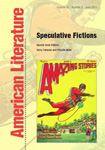Posts Tagged ‘future shock’
Saturday Morning Breakfast Links
* The new issue of Science Fiction Studies is dedicated to Chinese science fiction.
* Breaking: Liberal arts majors didn’t kill the economy.
* Judith Butler’s Remarks to Brooklyn College on BDS.
* In the beginning, God created the wealth and the jobs. Now the wealth was a formless void and darkness covered the sources of value, while the spirit of capitalism hovered over the depths. And then God said, “Let there be jobs,” and there were jobs. And God saw that the jobs were not very good; and God separated the jobs from the surplus-value. God called the surplus-value Wealth, and the jobs he called Generosity. And there was evening and there was morning, the first day. Genesis 1: A Neoliberal Account.
* SMBC tackles the unholy nexus of predestination and time travel.
* Janet Stephens, amateur hairdressing historian. Fun story, despite the classist overtones.
* The real Cuban missile crisis. So, both JFK and RFK were insane, I guess? Perhaps we should give this quantum immortality theory some serious consideration.
* Fox News screws up every day, but this one is pretty classic.
* There’s obviously some sort of long-term plan here that I don’t yet understand, like the time-bombs hidden in No Child Left Behind: North Carolina to formalize two “tracks” of high school diplomas, “job-ready” and “college-ready.”
* The Talmudic solution to the drone crisis: invent (another) secret, unaccountable court system in lieu of actual due process.
* And George Bush, painter.
Friday Friday Friday
* Somebody awesomely trolled the New York state assessment exam.
* Concluding that racial bias played a significant factor in the sentencing of a man to death here 18 years ago, a judge on Friday ordered that the convict’s sentence be reduced to life in prison without parole, the first such decision under North Carolina’s controversial Racial Justice Act.
* Americans Elect can’t get it together either (and thank heaven for that).
* “Special Effects” is the first great Ze Frank video of the “A Show” era.
* Things Don’t Seem Wonderful If You’ve Seen Them All Your Life.
* H.P. Lovecraft Answers Your Relationship Questions.
* Brian Wood teases The Massive.
* Abigail Nussbaum says The Cabin in the Woods wasted a perfectly good plot.
Once you know The Cabin in the Woods‘s twist it’s impossible not to think of the film like this, and to have used this rich vein of story for little more than a metafictional gag seems like a criminal waste.
* Science has finally perfected the sonic screwdriver.
* Zero-hour for high-speed rail in California.
* Mike Konczal and Aaron Bady talk The Wire at bloggingheads.tv.
* And there are struggles deeper than the struggle with God: The Stages of Grading.
Bonus Kim Stanley Robinson Video: ‘We Are Living in a Science Fiction Novel That We All Collaborate On’
As promised, here’s a bonus Kim Stanley Robinson video from the Polygraph/FHI event the night before the “Science, Religion, Ideology” talk. (I’m very sorry I couldn’t put up more, but I found this event was actually rather difficult to excerpt, and that much of what is excerptable is echoed in the later talk anyway. It was a great conversation—but a lengthy and somewhat twisting one.)
He talks here about a claim he’s made elsewhere, that science fiction is the realism of our time. A brief transcript of the first part of his reply follows the video.
KSR: I think it’s very true that we are living in a science fiction novel that we all collaborate on, and it’s because everything that science fiction was about through its historical named period, the twentieth century, has kind of come true. And also we live in a world that is so intensely structured by science and technology that we can’t get out of it. If we were to get out of it would still be a science fiction move, the retreat to the farm. So it’s hegemonic, you can’t escape it, we’re in that world created by science and technology.
And also there’s this intense sense of futurity, in that if you opened up your newspaper or laptop tomorrow and it said, “They’ve cloned six South Koreans successfully and they’re all named Kim,” you would believe it, there would be no surprise there. Anything could happen. You could say, well, we just got a signal from Alpha Centauri, there are intelligent aliens there, they sent us the code for pi and the Pythagorean theorem. There’s no reason to disbelieve that, either. So we live in this world of anticipation of strangeness, of change, rapidly accelerating change.
I came through the Atlanta airport today, and you know those speedwalkers that are underneath the various terminals? When I was young there was this famous bestseller, Future Shock, by Alvin Toffler. Future shock: we don’t talk about that anymore because none of you are shocked. And that’s because the shock comes at the moment you step on the walkway and you feel the drag between one acceleration and another. At the moment you’re being accelerated to a new speed there’s a little gravity drag on your body, and that’s the moment of “future shock”—1972 or ‘3—and when you’re walking with the walkway that’s moving at a different speed there’s no shock there. You simply are moving at that speed. So now we’re moving a new historical speed that’s faster than the historical speed was when I was a kid. That moment was marked by this book Future Shock, and it’s an archaic term, obsolete, because there’s nothing in our experience now… I don’t think there’s anything that could happen that would shock us, because we’re moving at such a fast speed now, and because we’re conditioned by science fiction.
GC: What about the other end of the runway?
KSR: When you slow down? Well, that’s another—you feel that too. This is like when your connection to the Internet goes out for three days, or your phone line, or when your cell phone dies—these moments when you’re suddenly not having the sixth sense of the cloud…
Elsewhere, U.S.A.
I’ve got another book review in the Indy this week, this one of Dalton Conley’s Elsewhere, U.S.A.
Future Drag
Apropos of my birthday, this post from Kottke on “timeline twins.”
When I was a kid, “oldies” music and movies seemed ancient. Even though I’m now in my 30s, the entertainment that I watched and listened to in my youth still feels pretty recent to me. Raiders of the Lost Ark wasn’t all that long ago, right? But comparing my distorted recall of childhood favorites to the oldies of the time jogs my memory in unpleasant ways. For example:
Listening to Michael Jackson’s Thriller today is equivalent to listening to Elvis Presley’s first album (1956) at the time of Thriller’s release in 1982. Elvis singles in 1956 included Blue Suede Shoes, Hound Dog, and Love Me Tender.
Lots more examples in the post and in Kottke’s comments. Surely every generation experiences this to some extent or another—but it seems to me there really is good reason to think there’s more cultural distance between Hound Dog and Thriller than between Thriller and now. (Though I must admit that to my comfortable perch on this side of thirty Thriller doesn’t seem especially fresh.)
First, the political, cultural, and technological revolutions of the ’60s and ’70s really were far more radical than anything that has been experienced since. Not every set of 36 years is identically tumultuous.
But the way we consume media has also changed in a way that has tended to ensure continuity, in two senses—first, technologies like the explosion of niche cable networks, DVDs, MP3s, YouTube, etc. allow media-cultural events to have cultural vitality for far longer, and second, repeated quotation and citation as both self-referentiality and nostalgia (famously characteristic of postmodernism) has in general helped keep these things alive.
Against future shock, call it future drag: things no longer seem to change, time no longer seems to pass, the past is always at our fingertips.
I also like the analogy improbable makes to oil painting:
Lots of other fields have the same property of developing rapidly once the technology is there. We’ve had oil paints for how many centuries? The first few decades saw rapid innovation, and the grand masters are from not long after that.
So music back then really was newer, fresher, and better. That’s why we’re still listening: it’s still the best there is.










